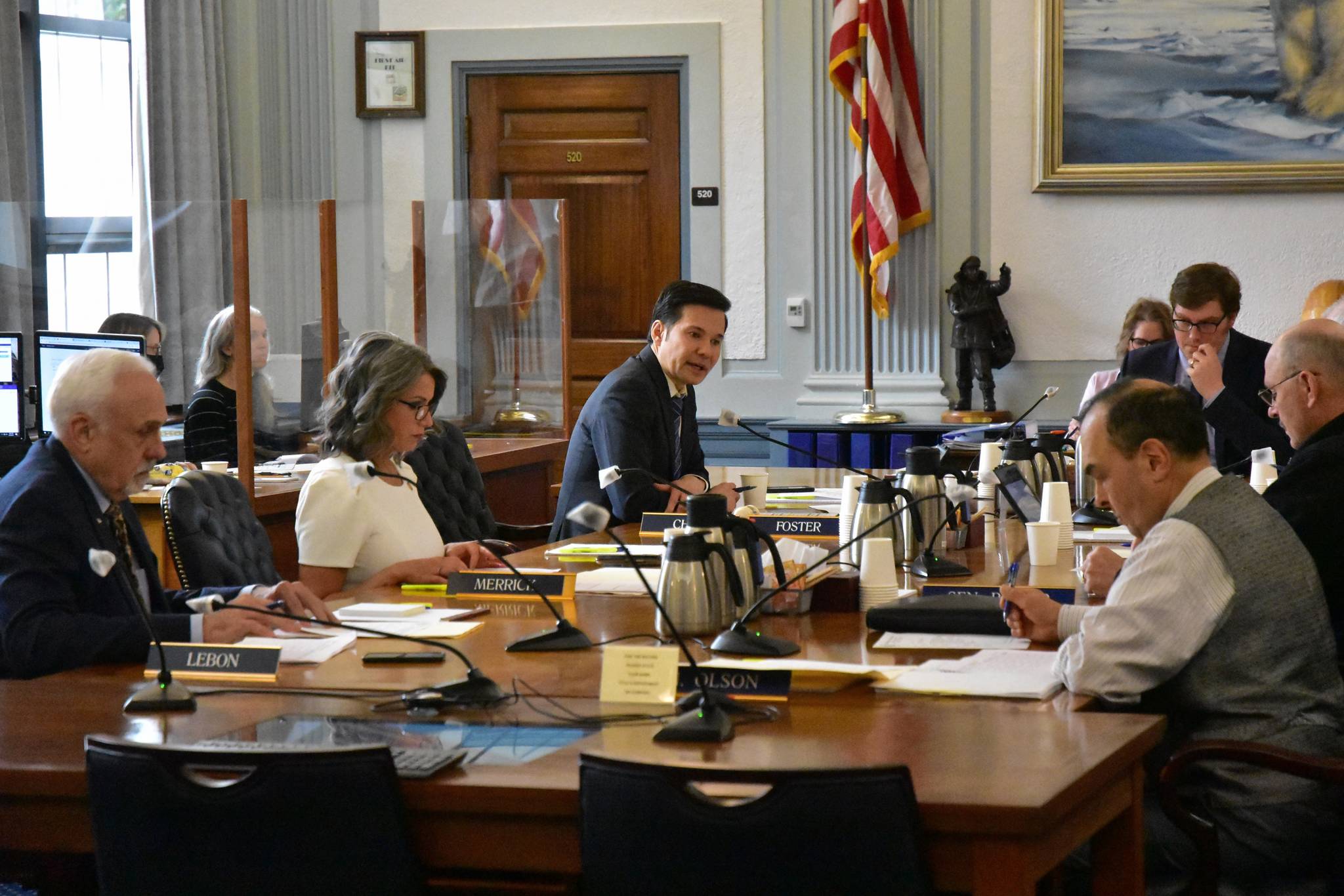Negotiations over the state’s budget began in earnest Wednesday when lawmakers on a bicameral conference committee had their first official meeting.
Earlier in the week lawmakers said they hoped to finalize the budget by Memorial Day weekend, but the committee’s chair Rep. Neal Foster, D-Nome, said he expected discussions to continue through the end of the special session in mid-June.
“I suspect the first meeting or two you’ll see a lot of items that we agree on and then we’ll start to get into some of the more difficult items,” Foster told reporters Wednesday morning, adding the final budget likely wouldn’t be finished until next month.
The committee met for just over 20 minutes Wednesday afternoon at 4 p.m. and approved several supplemental operating amounts appropriated in the Senate’s version of the budget. Federal American Rescue Plan Act funding guidelines were issued after the House passed its budget, Foster said, and Senate changes were made to be within those guidelines.
A second meeting wasn’t officially scheduled at the end of the first meeting, but Foster said committee members were hoping to meet at 11 a.m. Thursday. He noted that time was subject to change. Speaking to reporters earlier in the day Foster said he expected the second meeting to take place after the holiday weekend on June 2.
[Lawmakers: Budget negotiations to begin Wednesday]
“Speaking with the Senate we’ve taken the conclusion we’re taking things one day at a time right now, we’re willing to get as much off of the table that way we’re left with some of the bigger issues,” Foster said. “Some of these things just take time, as much as we’d like to shoot for a date it’s hard to say what that date might be.”
The budget bill includes both the state’s operating and capital budgets and an Alaska Permanent Fund dividend, but Foster said committee members also want to include a vote to reverse a state accounting mechanism known as the sweep. The sweep empties several state accounts at the end of each fiscal year and requires a three-quarters vote in each body to reverse.
Neither body has the supermajority vote necessary to pass the reverse sweep, Foster said, so the committee would have to negotiate a budget that would clear that threshold. But lawmakers in both bodies have taken strong positions on both sides and significant compromises will have to be found, Foster said.
According to Foster, ARPA funds may be able to be used to backfill lost revenues, which could free up money from the operating budget to be put toward a PFD.
Both bodies met briefly Wednesday to give additional powers to the conference committee allowing those members more flexibility in what they were able to change, but some members of the House of Representatives expressed disappointment with the process.
Rep. Steve Thompson, R-Fairbanks, said he had remained in Juneau while senators had returned home, causing further delay in what was an already extended session.
The conference committee is made up of the four finance committee chairs from both bodies: Sens. Click Bishop, R-Fairbanks and Bert Stedman, R-Sitka, and Reps. Kelly Merrick, R-Eagle River, and Neal Foster, D-Nome. Sen. Donny Olson, D-Bethel, will represent the Senate minority.
Thompson had been chosen to represent the House minority and said Wednesday he was told by leadership negotiations would be finished by Memorial Day weekend. However, delays meant Thompson could no longer serve on the committee, he said, and was replaced Wednesday by Rep. Bart LeBon, R-Fairbanks.
“Last two weekends I didn’t go home because I thought we were going to work,” he said on the floor of the House during Special Orders, a time when lawmakers are given wide latitude to speak on topics of their choosing. Thompson’s topic of choice Wednesday was “frustration.”
“I hope (the budget) has a fast resolution, but I don’t see how it’s going to,” Thompson said. “It has been waiting and waiting and waiting. In 11 years of being down here, I’ve never seen anything like this.”
Lawmakers aren’t allowed to mention their peers by name, but Thompson was clear he was referring to the Senate.
“The problem is not here, not with us. We’ve been very clear we’ve been willing to work,” he said. “I just want to let everybody know it’s not our fault.”
But the technical work analyzing the differences between the House and Senate versions of the budget was still being finished, according to Senate President Peter Micciche, R-Soldotna, who said neither body was responsible for the delays.
“Conversations are taking place while they’re working through the mechanical stuff,” Micciche said in a meeting with reporters.
The committee was still waiting on a representative from the Office of Management and Budget to assist with ARPA funding allocations, Micciche said, which was also delaying committee negotiations. The budget negotiations were a difficult conversation and both sides had entrenched positions, Micciche said in an interview with reporters. Discussions over the size of the PFD also weren’t holding up the committee’s work, he said, because lawmakers weren’t even at the point where those discussions could be had.
“The budget needs to be passed, it’s the one big job we have here,” Micciche said. “I think it will happen over the next couple of weeks and I think we can all be equally unhappy with the outcome.”
• Contact reporter Peter Segall at psegall@juneauempire.com. Follow him on Twitter at @SegallJnuEmpire.

